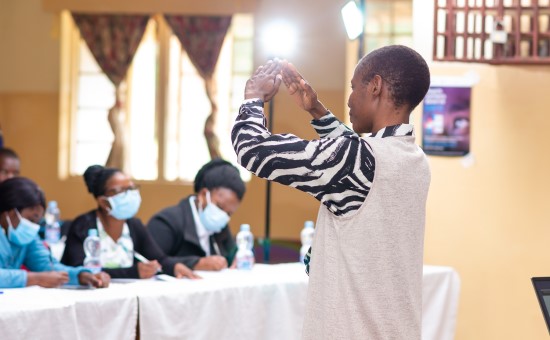
24 Aug Supporting Mental Health Resilience of Malawi’s Health Workforce Using an AI-powered Chatbot
“It’s very exciting… I feel like I have a companion, someone that I can talk to… The app, I feel like, somehow understands me.”
– Thokozani Chiudzu,
Radiographer, Zomba Central Hospital
In response to COVID-19, the government of Malawi approved the recruitment of 2,000 additional health workers. Yet, health workers are still faced with increased workload and many also face additional challenges, such as harassment and stigma in their communities due to the fear of the disease. These stresses put health workers at particular risk for anxiety and depression, and Malawi has few mental health specialists or other resources available to offer support for these issues. To address these challenges, USAID and HRH2030 partnered with Vitalk, which uses an artificial intelligence (AI)-powered virtual mental health care assistant, to see if using the Vitalk app could support the psychosocial well-being and resilience of Malawi’s health workers.
HRH2030, Vitalk, and a local team of experts adapted the content, language, and functionality of Vitalk’s platform to the context of Malawi and conducted a proof-of-concept pilot in Zomba district, led by a counselling psychologist from the University of Malawi, Tilinao Lamba. Approximately 300 health care workers from hospitals and health facilities across Zomba participated in the 30-day pilot, which included a series of workshops. During the orientation workshops in May, Lamba led participants through exercises and discussions on the various mental health and psychosocial challenges that health care professionals face and explained how some might be addressed using Vitalk’s mobile application.
“People seem to be very much engaged with the app… We’re hoping that it’s going to be beneficial in the long run for their mental health,” said Lamba. Meet Lamba in the video below.
In the following month, the health workers shared their experience of using the app and provided feedback on recommended changes. The results of the pilot demonstrated that use of the app led to statistically significant decreased levels of risk of anxiety, depression, and burnout, and increased resilience among the 70 participants who completed the pre- and post-check-ups over the proof-of-concept period. Participating health workers reported positive feedback on the inspiring and friendly interactions that Viki, the chatbot, offered. They also reported that the short and practical exercises offered through the app were easily followed and helped them to cope with their everyday mental health challenges.
Anna Mateyu, a nursing officer from Zomba Central Hospital, described her interaction with the Vitalk app to Lamba this way:
Pharmacy assistant Dalitso Muonya, who works at the Machinjiri Health Centre in Zomba said that using the application was “[an] eye opener” because it captured the daily mental health and psychosocial issues that health workers face. He added that the app offers “some advice that we may get from experts, but we don’t have the opportunity to have [access to people with] expertise on a daily basis.”
HRH2030 awarded Vitalk its 2020 Health Workforce Resilience Prize, after a global competition to discover innovations to support health worker well-being that could be scaled. In Brazil, Vitalk has already shown its effectiveness in reducing some symptoms of anxiety, depression, and stress of the health care workers. As the pilot has shown, Vitalk’s platform can provide a lower cost digital psychosocial wellbeing and mental health solution to support resilience of Malawi’s health workers by replacing traditional therapy and coaching.
Vitalk team members in Brazil are pleased with the initial results. Cássia Martin, the product manager responsible for adapting the app for use in Malawi, said, “This pilot showed us that the app is able to make significant changes in people’s mental health, no matter where it is used, which is our goal. The project has helped Vitalk to understand how our content and features can be adapted to different cultures, and we are thrilled with the results and overall improvements in health workers’ mental health.”
Based on the usage results and feedback from initial participating health care professionals in the proof-of-concept pilot, Vitalk and HRH2030 will conduct a randomized control trial in an urban district to rigorously evaluate the effectiveness of the chatbot in supporting the mental health and psychosocial wellbeing for increased resilience of health care professionals impacted by COVID-19 and other work stressors.
Photo: Tilinao Lamba and health workers at the Vitalk proof-of-conecpt pilot workshop. Courtesy of Frenchie Visuals, Film and Photography.





